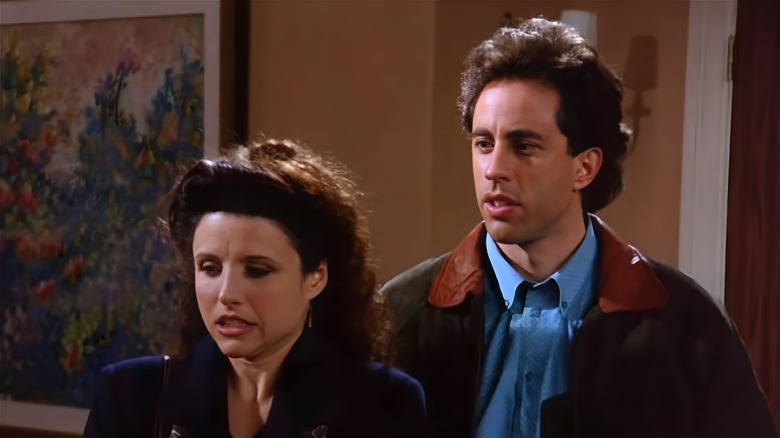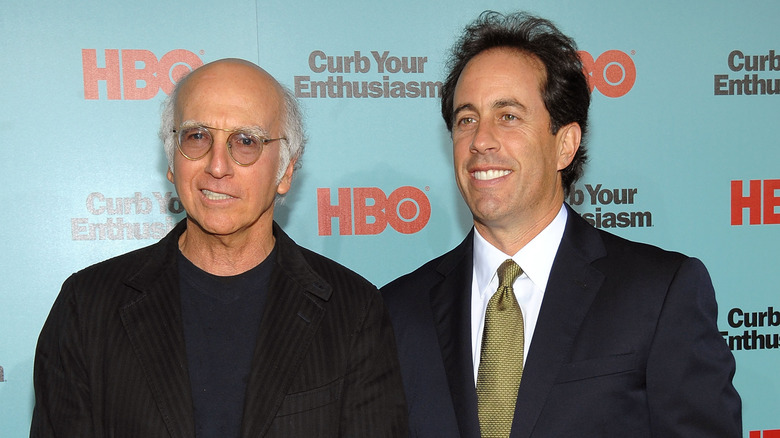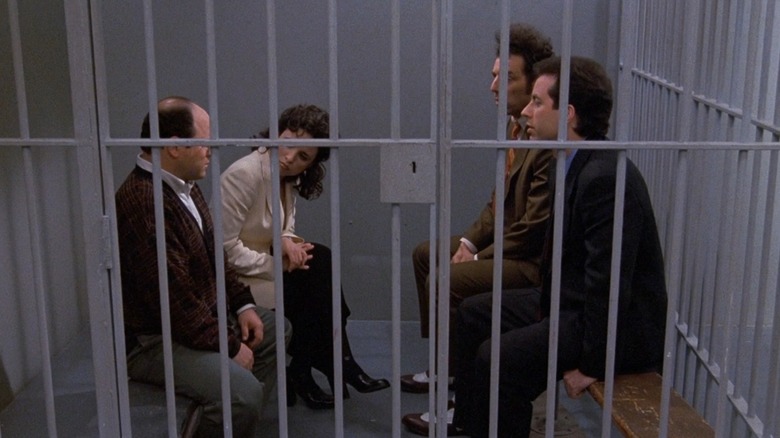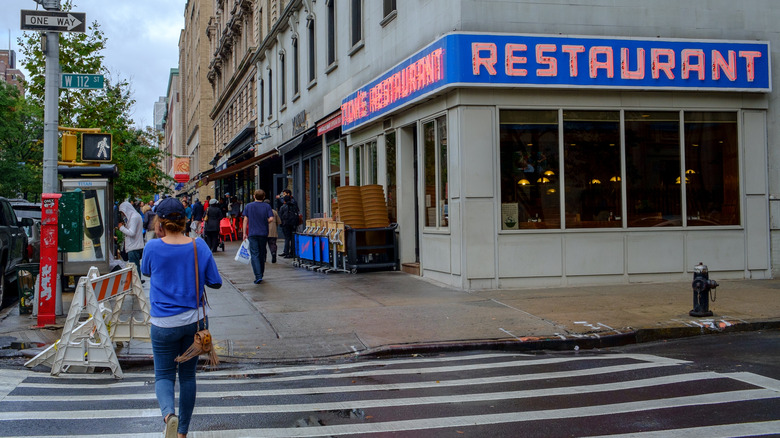A Seinfeld Reboot Could Only Work If It Follows The Path Blazed By That '90s Show
Surely, the legacy of some sitcoms should never be messed with, right?
And yet, the lion's share of popular sitcom IPs have seen themselves rebooted or sequelized eventually, usually debuting to a chorus of protests from fans. Sometimes, the original cast is jettisoned completely — see "One Day at a Time." Other shows have simply picked things right back up from where the original series ended, with the original cast (or most of them) completely intact, like "And Just Like That..." or "Will and Grace." And then, somewhere between the two, we have "That '90's Show."
While keeping true to the spirit of its parent series, "That '90's Show" — which now has a second season on the way — keeps its focus not on the returning characters, but on their now-teenage children, Leia Forman (Callie Haverda) and Jay Kelso (Mace Coronel). Most of the original cast pops up and appears sporadically throughout its first season, but they never steal the spotlight. Instead, the "That '70s Show" world is opened up and made larger by their presence, while the adventures of the new kids are anchored by grandparents Red Forman (Kurtwood Smith) and Kitty (Debra Jo Rupp), who still have the unforgettable basement we all remember.
Okay, here comes the part you're going to hate, but buckle up and hear us out. Let's do something radical. Let's challenge the impossible. Let's imagine a "Seinfeld" reboot orchestrated in the same fashion, playing by the same rules, and see why that might be the perfect — nay, only — way to continue the iconic comedy's legacy without wrecking it.
Keep the original Seinfeld's voice, but bring in new characters and blaze a new trail
Looking at "That '90s Show," one of the reasons it's such a success is that the show's co-creators and original producers are still on board. Now, if we shift our gaze to "Seinfeld," a new show would be absolutely nothing without the vision of Larry David and Jerry Seinfeld, ergo, they should definitely be involved in anything that comes to blossom. So, yes, to quell any fears, no "Seinfeld" reboot is allowed if those two guys don't sign onto it. Obviously, the success of "Seinfeld" sprung from excellent writing, David and Seinfeld's uniquely neurotic (and uniquely Jewish) perspective, and good performances, so any continuation of the series ought to prioritize these notions.
As for whether the show's storyline should logically continue, though? Let's face it. What we all really loved about "Seinfeld" wasn't necessarily the self-absorbed characters (okay, we did love them, but they're not always easy to root for), but rather, its distinct comedic sensibilities. "Seinfeld" was a idiosyncratic show that absolutely centered on the sarcastic, self-deprecating miseries of its co-creators, Larry David and Jerry Seinfeld. This sense of humor was the true main character, not Jerry, Elaine, George, or Kramer.
That means a continuation needs to focus on bringing back that humor, that vibe, and the story and characters who accomplish this are secondary. Thankfully, "That '90s Show" has already solved this puzzle.
Seinfeld's core appeal is its humor, not its characters - and that's why That '90s Show's approach could work
That said, on a storytelling level, it's hard to deny that the show's harsh conclusion — which sees Jerry (Seinfeld), Elaine Benes (Julia Louis-Dreyfus), Cosmo Kramer (Michael Richards) and George Costanza (Jason Alexander) thrown in a small-town jail — didn't leave a sour taste in the mouths of most viewers. The finale is notorious among viewers, a rare blemish on the series' track record. Do we really want that to be the last time we ever see these guys?
There are two ways to revitalize "Seinfeld" after its downer finale. You could build the show around the entire gang trying to cope with life in the 2020s after being released from prison — which sounds like more a downer, doesn't it? — or, you could take a page out of "That '90's Show," by featuring a few vital original characters in supporting roles (thereby showing they did get out of prison) but shifting focus to a younger cast in their 30s, who are somehow related to the gang and exploring the awkward trials and tribulations of being single, obsessed with minutia, and living in 21st century New York.
The new cast shouldn't be a perfect mirror of the original cast, either. The humor of "Seinfeld" can be applied to different types of people than we saw before, in totally different situations, and easily be just as funny. Imagine that "Seinfeld"-style neurotic humor coming from the observations of a young, gay New Yorker, for example, navigating today's landscape of dating apps? Bringing more diversity to the cast would allow new nuances while still being true to the original show's gist and feeling, but without simply retreading the material.
Monk's Cafe is the centerpoint of the new Seinfeld show
How would you tie a "That '90s Show"-style "Seinfeld" back to the original series? It's all about Monk's Cafe, the equivalent to the Forman basement. As long as the characters still meet there for coffee, the characters themselves are flexible. Monk's can be renamed, gentrified — all sorts of humorous possibilities there — but it's the pivotal meeting point.
As for how to connect to the original cast? Family relations are one way. It's very easy to imagine George having a daughter, for instance, who is every bit as spiteful as her father and occasionally visits his Queens apartment for bad advice that she hates.
Alternatively, what if the main character was a young, cynical Boston lawyer who is the one who successfully got the gang out of prison, has now moved to NYC, and still meets with them occasionally? You could also center the show around a young professional who is being mentored by Elaine, a nephew of Kramer's, Jerry's now grown-up godson (we remember "The Bris," right?) or any number of possibilities — as long as it doesn't feel too manufactured, and as long as they still meet up at the same cafe. All of these ideas would make the old characters frequent visitors to the reboot, without tarnishing the original show or risking further alienation with the original "Seinfeld" audience.
Now, let's be honest. It's highly doubtful we'll see a "Seinfeld" reboot or continuation series at this time. But it's definitely still fun to speculate how to successfully transport the old format into the modern era, and arguably, this is the only way to make it work.



